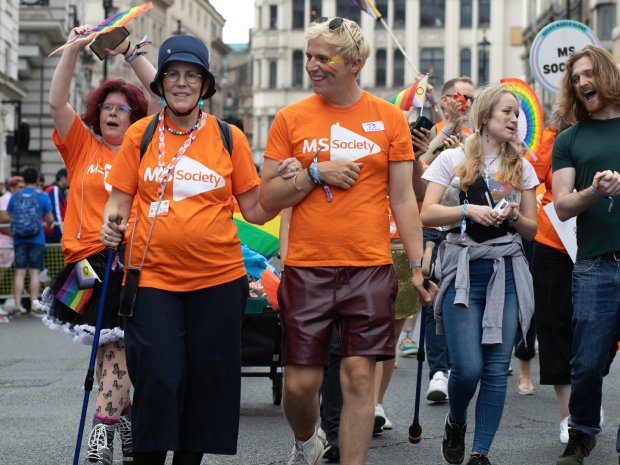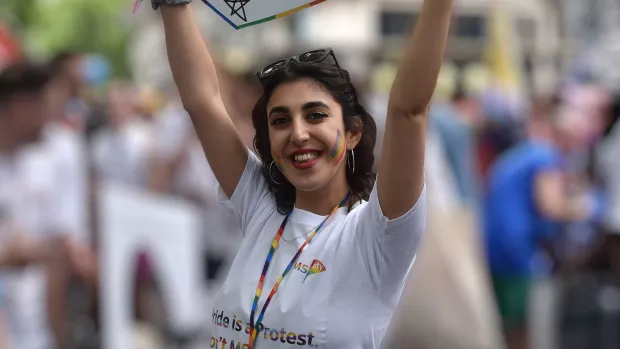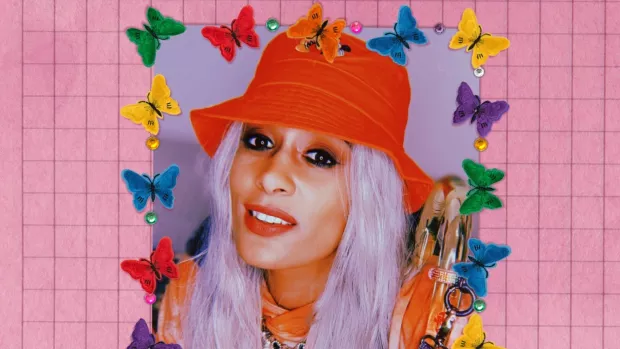
Our LGBTQIA+ community and MS healthcare
We're proud to stand with the LGBTQIA+ members of MS community. Find out how our LGBTQIA+ MS community experiences MS healthcare, and what we're doing.
LGBTQIA+ is an evolving acronym that stands for lesbian, gay, bisexual, transgender, intersex, queer or questioning and asexual. The + represents other terms (like non-binary and pansexual) that people use to describe their experiences of their gender or sexuality.
LGBTQ+ experience of health services
We already know that LGBTQIA+ people generally reported worse experiences with accessing health services. In the government’s 2017 National LGBT survey, 16% of LGBTQ+ people said they had a negative experience. And 38% had a bad experience because of their gender identity.
Sadly, for many, this won’t come as a surprise.
But what about in neurology?
Last year, over a thousand people with MS took part in the My Neuro Survey. it was the largest survey of people living with neurological conditions in the UK. Overall, the survey found that people living with neurological conditions experienced unacceptable delays in their care. And far too many were unable to access mental wellbeing support.
Read our tips on emotional wellbeing
The number of responses was small. But experiences shared by LGBTQ+ people paint an even worse picture:
- Bisexual people living with a neurological condition reported being more likely to experience delays to neurological care or treatment.
- Gay, lesbian, bisexual and trans people were more likely to report that their neurological condition made their mental wellbeing much worse.
- Trans and bisexual people who got support for their mental wellbeing were significantly more likely to report that it didn’t make them feel better or more positive.
- Gay or lesbian and bisexual people were more likely to report that their health and care wasn’t joined up and centred on their priorities.
The Neurological Alliance published a briefing on their findings which talks more about the experiences of LGBTQ+ people with neurological conditions.
Read the full briefing on the Neurological Alliance’s website
Does it have to be like this?
No. But there's no quick fix.
Improving neurological services for LGBTQIA+ people improves services for everyone. But to achieve this, we need to bring together leaders across Government, the NHS and patient representatives.
That’s why we’re campaigning for the UK Government to establish a Neuro Taskforce in our #BackThe1in6 campaign. This taskforce must have a focus on tackling the unacceptable and ongoing inequalities in health and care.
This is only possible if the experiences of LGBTQIA+ people are given the attention they deserve and are listened to.
Read more about our #BackThe1in6 campaign
What are we doing?
Sharing stories
We’re committed to making sure all voices in the MS community are heard. Not just in LGBTQ+ History Month, but all year round.
Standing together
We’re proud to stand up for the LGBTQIA+ MS community. In recent years, we’ve been taking part in Pride events across the UK and we hope to join even more. This year, we’ll be taking part in our first Black Pride in London. But we know LGBTQIA+ people with MS are everywhere, not just in the capital.
A deeper understanding
Experiences shape people. And we want to understand how they impact peoples’ experiences of MS. So we’ve been working with researchers to better understand intersectionality in MS, with more work planned across 2023.
Join us at this year's London Pride parade
Our LGBTQIA+ staff group ‘Spectrum’ is organising our group wristbands and would be delighted if you can join. Our spaces are limited so we can't guarantee a spot, it's first come first served.
Sign up through Eventbrite's website
To find out more or tell us about your accessibility needs, email [email protected].
We’re proud to show up for LGBTQIA+ people with MS and celebrate the LGBTQIA+ MS community.


